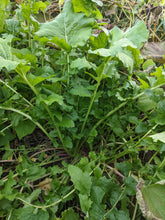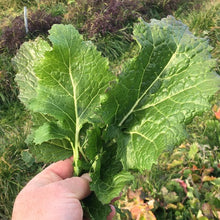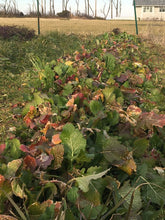Accawmacke Broccoli (Turnip Greens/Broccoli Raab)
Regular price
$4.00
Sale
Brassica rapa
Origin: Accomack, Virginia
Improvement status: Landrace
Seeds per packet: ~100
Germination tested 10/2025: 97%
Life cycle: Biennial
EFN EXCLUSIVE. Just when we think we've seen it all, we stumble on a new surprise! Those of you who have been following EFN since the beginning know that one of our favorite crops — indeed, one of our calling cards at this point — is 'Deitrich's Wild Broccoli Raab.' Named for our long-term farm hosts in Elmer, New Jersey, 'D.W.B.R' is a partially re-domesticated feral turnip population that thrives in the hayfields, hedgerows, and garden beds at the Deitrichs' farm. We love it because it's exceedingly cold hardy, edible as turnip greens its first year, and the earliest substantial crop every spring (or late winter) when it begins sending up the tender and tasty flower spikes for which it's named. We knew that we weren't the only people eating the feral turnips that grow as weeds across our area, but we thought we were probably the only ones to give them a name and start selling the seeds.
Sure enough, we were dead wrong. On Nate's annual fall swing through Delaware and Virginia to harvest chinquapin chestnuts, he and friends Eliza Greenman and Eric Blasco had made plans to pull over if an enticing roadside stop beckoned. Just south of the border with Maryland on Virginia's Eastern Shore, signs saying "Rare Plants" and "Native Plants" prompted a sudden stop as the lush greenery of Thomas Gardens nursery quickly came into view. The three plant-nerds walked every aisle, ogling (and occasionally snagging) red enset banana trees, papyrus plants, dozens of hosta varieties, and other beautiful, healthy, hard-to-find plants. Inside the squat main building with the checkout counter, a small table held a couple dozen jars of seeds. Nate glanced at them and only noticed standard varieties, so didn't give them a second thought. Thankfully Eric took a closer look and called Nate over to ask if he'd ever heard of "Accomack Broccoli" — which he most certainly had not. A quick web search found just one hit, an article on a site called The Local Palate with the title "Can the revival of historic foodways breathe new life into Virginia's Eastern Shore?" It was a brief but exciting mention in the following paragraph:
The Eastern Shore of Virginia has some distinct ingredients, such as white-fleshed Hayman sweet potatoes, Hog Island lamb and mutton, 'Accomack broccoli' (actually a non-rooting turnip with bitter greens), and a wide variety of heirloom figs; there are indigenous dishes, including clam fritters, oyster pie, and black duck and dumplings. And along with traditional shellfish and crabs, there’s also a reverence for fish less-heralded elsewhere, such as spot and puffer fish ('swellin’ toads' in local parlance). It’s a plain cuisine with minimal ingredients. But most now-celebrated Southern cuisines began humbly. (Shrimp and grits was a regional, workingman’s dinner long before chefs elevated it to the white tablecloth.)
A short conversation with the person at the counter confirmed that it's also a biennial, and that the second-year flower heads are eaten. She said that a farmer a few miles away produced the seed. Nate bought two pounds on the spot and we're happy to be able to offer it to you now! We're still getting to know this plant ourselves, but it's obviously a beloved part of the food culture of a little-known corner of Virginia, so we have no doubt it must be something special. Please let us know how it does for you and what you think of it!
UPDATE: After less than two months of offering these seeds, we were happily contacted by the original grower, Robert "Gus" Gustafson, of Machipongo, Virginia, who provided the sees to Thomas' Nursery. Gus sent us the photos you see here now (he reports that the Chesapeake Bay is just past the house in the photo with the plants in the ground), and also corrected our spelling so it matches the spelling under which he got the seeds (a decade ago, from a farmer in nearby Craddockville, VA). Interestingly, he says he's never eaten the flower spikes, but relishes the leaves — and, most excitingly, the seeds themselves, which it hadn't occurred to us might also be used as food.
Gus writes: "I have one 25 foot row of Accawmacke Broccoli turnip greens growing right now, principally for seed, although I have quite a bit of seed on hand from last year. I use it in baking, mainly as an additive to crackers along with benne [a Gullah-Geechee heirloom sesame]. I should get a gallon or more of seed from that row. Of course we also eat the leaves... We eat them as a mess o’ greens with smoked turkey meat through the winter but I also developed a great recipe for Accawmacke broccoli and oyster gratin that I think is excellent."






